- Home
- Harlan Coben
Harlan Coben 3 Novel Collection Page 36
Harlan Coben 3 Novel Collection Read online
Page 36
Winner of the Edgar Award, the Shamus Award, and the Anthony Award, Harlan Coben is the author of eleven previous novels, including the New York Times bestsellers Just One Look, No Second Chance, Gone for Good, and Tell No One, and the popular Myron Bolitar series. He lives in New Jersey with his wife and four children.
THE WOODS
ALSO BY HARLAN COBEN
Deal Breaker
Drop Shot
Fade Away
Back Spin
One False Move
The Final Detail
Darkest Fear
Tell No One
Gone for Good
No Second Chance
Just One Look
The Innocent
Promise Me
HARLAN COBEN
THE WOODS
DUTTON
DUTTON
Published by Penguin Group (USA) Inc.
375 Hudson Street, New York, New York 10014, U.S.A.
Penguin Group (Canada), 90 Eglinton Avenue East, Suite 700, Toronto, Ontario M4P 2Y3, Canada (a division of Pearson Penguin Canada Inc.); Penguin Books Ltd, 80 Strand, London WC2R 0RL, England; Penguin Ireland, 25 St Stephen’s Green, Dublin 2, Ireland (a division of Penguin Books Ltd); Penguin Group (Australia), 250 Camberwell Road, Camberwell, Victoria 3124, Australia (a division of Pearson Australia Group Pty Ltd); Penguin Books India Pvt Ltd, 11 Community Centre, Panchsheel Park, New Delhi–110 017, India; Penguin Group (NZ), 67 Apollo Drive, Mairangi Bay, Auckland 1311, New Zealand (a division of Pearson New Zealand Ltd); Penguin Books (South Africa) (Pty) Ltd, 24 Sturdee Avenue, Rosebank, Johannesburg 2196, South Africa
Penguin Books Ltd, Registered Offices: 80 Strand, London WC2R 0RL, England
Published by Dutton, a member of Penguin Group (USA) Inc.
Copyright © 2007 by Harlan Coben
All rights reserved
REGISTERED TRADEMARK—MARCA REGISTRADA
LIBRARY OF CONGRESS CATALOGING-IN-PUBLICATION DATA HAS BEEN APPLIED FOR.
ISBN: 1-101-12867-4
PUBLISHER’S NOTE
This book is a work of fiction. Names, characters, places, and incidents either are the product of the author’s imagination or are used fictitiously, and any resemblance to actual persons, living or dead, business establishments, events, or locales is entirely coincidental.
Without limiting the rights under copyright reserved above, no part of this publication may be reproduced, stored in or introduced into a retrieval system, or transmitted, in any form, or by any means (electronic, mechanical, photocopying, recording, or otherwise), without the prior written permission of both the copyright owner and the above publisher of this book.
The scanning, uploading, and distribution of this book via the Internet or via any other means without the permission of the publisher is illegal and punishable by law. Please purchase only authorized electronic editions, and do not participate in or encourage electronic piracy of copyrighted materials. Your support of the author’s rights is appreciated.
This one is for
Alek Coben
Thomas Bradbeer
Annie van der Heide
The three joys I’m lucky enough to call my godchildren
THE WOODS
Contents
PPROLOGUE
CHAPTER 1
CHAPTER 2
CHAPTER 3
CHAPTER 4
CHAPTER 5
CHAPTER 6
CHAPTER 7
CHAPTER 8
CHAPTER 9
CHAPTER 10
CHAPTER 11
CHAPTER 12
CHAPTER 13
CHAPTER 14
CHAPTER 15
CHAPTER 16
CHAPTER 17
CHAPTER 18
CHAPTER 19
CHAPTER 20
CHAPTER 21
CHAPTER 22
CHAPTER 23
CHAPTER 24
CHAPTER 25
CHAPTER 26
CHAPTER 27
CHAPTER 28
CHAPTER 29
CHAPTER 30
CHAPTER 31
CHAPTER 32
CHAPTER 33
CHAPTER 34
CHAPTER 35
CHAPTER 36
CHAPTER 37
CHAPTER 38
CHAPTER 39
CHAPTER 40
CHAPTER 41
CHAPTER 42
EPILOGUE
ACKNOWLEDGMENTS
ABOUT THE AUTHOR
PPROLOGUE
I SEE MY FATHER WITH THAT SHOVEL.
There are tears streaming down his face. An awful, guttural sob forces its way up from deep in his lungs and out through his lips. He raises the shovel up and strikes the ground. The blade rips into the earth like it’s wet flesh.
I am eighteen years old, and this is my most vivid memory of my father—him, in the woods, with that shovel. He doesn’t know I’m watching. I hide behind a tree while he digs. He does it with a fury, as though the ground has angered him and he is seeking vengeance.
I have never seen my father cry before—not when his own father died, not when my mother ran off and left us, not even when he first heard about my sister, Camille. But he is crying now. He is crying without shame. The tears cascade down his face in a freefall. The sobs echo through the trees.
This is the first time I’ve spied on him like this. Most Saturdays he would pretend to be going on fishing trips, but I never really believed that. I think I always knew that this place, this horrible place, was his secret destination.
Because, sometimes, it is mine too.
I stand behind the tree and watch him. I will do this eight more times. I never interrupt him. I never reveal myself. I think he doesn’t know that I am there. I am sure of it, in fact. And then one day, as he heads to his car, my father looks at me with dry eyes and says, “Not today, Paul. Today I go alone.”
I watch him drive off. He goes to those woods for the last time.
On his deathbed nearly two decades later, my father takes my hand. He is heavily medicated. His hands are rough and calloused. He used them his whole life—even in the flusher years in a country that no longer exists. He has one of those tough exteriors where all the skin looks baked and hard, almost like his own tortoise shell. He has been in immense physical pain, but there are no tears.
He just closes his eyes and rides it out.
My father has always made me feel safe, even now, even though I am now an adult with a child of my own. We went to a bar three months ago, when he was still strong enough. A fight broke out. My father stood in front of me, readying to take on anyone who came near me. Still. That is how it is.
I look at him in the bed. I think about those days in the woods. I think about how he dug, how he finally stopped, how I thought he had given up after my mother left.
“Paul?”
My father is suddenly agitated.
I want to beg him not to die, but that wouldn’t be right. I had been here before. It doesn’t get better—not for anyone.
“It’s okay, Dad,” I tell him. “It’s all going to be okay.”
He does not calm down. He tries to sit up. I want to help him, but he shakes me off. He looks deep into my eyes and I see clarity, or maybe that is one of those things that we make ourselves believe at the end. A final false comfort.
One tear escapes his eye. I watch it slowly slide down his cheek.
“Paul,” my father says to me, his voice still thick with a Russian accent. “We still need to find her.”
“We will, Dad.”
He checks my face again. I nod, assure him. But I don’t think that he is looking for assurance. I think, for the first time, he is looking for guilt.
“Did you know?” he asks, his voice barely audible.
I feel my entire body quake, but I don’t blink, don’t look away. I wonder what he sees, what he believes. But I will never know.
Because then, right then, my father closes his eyes and dies.
CHAPTER
1
Three Months Later
I WAS SITTING IN AN ELEMENTARY SCHOOL GYMNASIUM, watching my six-year-old daughter, Cara, nervously navigate across a balance beam that hovered maybe four inches off the floor, but in less than an hour, I would be looking at the face of a man who’d been viciously murdered.
That should not shock anyone.
I have learned over the years—in the most horrible ways imaginable—that the wall between life and death, between extraordinary beauty and mind-boggling ugliness, between the most innocent setting and a frightening bloodbath, is flimsy. It takes a second to tear through it. One moment, life appears idyllic. You are in a place as chaste as an elementary school gymnasium. Your little girl is twirling. Her voice is giddy. Her eyes are closed. You see her mother’s face there, the way her mother used to close her eyes and smile, and you remember how flimsy that wall really is.
“Cope?”
It was my sister-in-law, Greta. I turned to her. Greta looked at me with her normal concern. I smiled through it.
“What are you thinking about?” she whispered.
She knew. I lied anyway.
“Handheld video cameras,” I said.
“What?”
The folding chairs had all been taken by the other parents. I stood in the back, arms crossed, leaning against the cement wall. There were rules posted above the doorway and those annoyingly cute inspirational aphorisms like “Don’t Tell Me the Sky’s the Limit When There Are Footprints on the Moon” scattered throughout. The lunch tables were folded in. I leaned against that, feeling the cool of the steel and metal. Elementary school gyms never change as we age. They just seem to grow smaller.
I gestured at the parents. “There are more video cameras here than kids.”
Greta nodded.
“And the parents, they film everything. I mean, everything. What do they do with all that? Does anybody really watch this again from beginning to end?”
“You don’t?”
“I’d rather give birth.”
She smiled at that. “No,” she said, “you wouldn’t.”
“Okay, yeah, maybe not, but didn’t we all grow up in the MTV generation? Quick cuts. Lots of angles. But to just film this straight out like this, to subject an unsuspecting friend or family member to that…”
The door opened. The moment the two men stepped into the gym I could tell that they were cops. Even if I didn’t have a fair amount of experience—I am the county prosecutor for Essex County, which includes the rather violent city of Newark—I would know. Television does indeed get some stuff right. The way most cops dressed, for example—fathers in the lush suburb of Ridgewood don’t dress that way. We don’t don suits when we come to see our kids perform quasi-gymnastics. We wear corduroys or jeans with a V-neck over a T-shirt. These two guys wore ill-fitted suits in a brown hue that reminded me of wood chips after a rainstorm.
They were not smiling. Their eyes scanned the room. I know most of the cops in the area, but I didn’t know these guys. That troubled me. Something felt wrong. I knew that I hadn’t done anything, of course, but there was still a little I’m-innocent-but-I-still-feel-guilty flutter in my stomach.
My sister-in-law, Greta, and her husband, Bob, have three kids of their own. Their youngest daughter, Madison, was six years old and in the same class as my Cara. Greta and Bob have been a tremendous help. After my wife, Jane—Greta’s sister—died, they moved to Ridgewood. Greta claims that they had planned on doing that anyway. I doubt it. But I am so grateful that I don’t question it much. I can’t imagine what it would be like without them.
Usually the other fathers stand in the back with me, but since this was a daytime event, there were very few here. The mothers—except for the one now glaring at me over her video camera because she overheard my anti-video-cam rant—adore me. It is not me, of course, but my story. My wife died five years ago, and I raise my daughter alone. There are other single parents in town, mostly divorced mothers, but I get a ton of slack. If I forget to write a note or pick up my daughter late or leave her lunch on the counter, the other mothers or the staff in the school office chip in and help. They think my male helplessness is cute. When a single mother does any of those things, she is neglectful and on the receiving end of the superior moms’ scorn.
The kids continued to tumble or stumble, depending on how you wanted to look at it. I watched Cara. She was big on concentration and did just fine, but I suspected she had inherited her father’s lack of coordination. There were high school girls from the gymnastics team helping. The girls were seniors, probably seventeen or eighteen. The one who spotted Cara during her attempted somersault reminded me of my sister. My sister, Camille, died when she was about this teen’s age, and the media never lets me forget it. But maybe that was a good thing.
My sister would be in her late thirties now, at least as old as most of these mothers. Weird to think of it that way. I see Camille forever as a teen. It is hard to imagine where she would be now—where she should be now, sitting in one of those chairs, the doofy-happy-concerned-I’m-a-mom-first smile on her face, overfilming her own offspring. I wonder what she would look like today, but again all I see is the teenager who died.
It may appear that I’m somewhat obsessed with death, but there is a huge difference between my sister’s murder and my wife’s premature passing. The first, my sister’s, led me to my current job and career projectory. I can fight that injustice in the courtroom. And I do. I try to make the world safer, try to put those who would harm others behind bars, try to bring other families something my family never really had—closure.
With the second death—my wife’s—I was helpless and screwed up and no matter what I do now, I will never be able to make amends.
The school principal strapped that faux-concerned smile onto her over-lipsticked mouth and headed in the direction of the two cops. She engaged them in conversation, but neither one of them so much as glanced at her. I watched their eyes. When the taller cop, the lead cop for certain, hit my face, he stopped. Neither of us moved for a moment. He gave his head the slightest tilt, beckoning me outside this safe haven of laughter and tumbling. I made my nod equally slight.
“Where are you going?” Greta asked me.
I don’t want to sound unkind, but Greta was the ugly sister. They looked alike, she and my lovely dead bride. You could tell that they were from the same parents. But everything that worked physically with my Jane just doesn’t quite make it on Greta. My wife had a prominent nose that somehow made her sexier. Greta has a prominent nose that looks, well, big. My wife’s eyes, set far apart, gave her an exotic appeal. On Greta, the wide spacing makes her look somewhat reptilian.
“I’m not sure,” I said.
“Business?”
“Could be.”
She glanced over at the two probable-cops then back at me. “I was going to take Madison to Friendly’s for lunch. Do you want me to bring Cara?”
“Sure, that’d be great.”
“I could also pick her up after school.”
I nodded. “That might help.”
Greta kissed my cheek gently then—something she rarely does. I headed off. The peals of children’s laughter rolled with me. I opened the door and stepped into the corridor. The two policemen followed me. School corridors never change much either. They have an almost haunted-house echo to them, a strange sort of semisilence and a faint but distinct smell that both soothed and agitated.
“Are you Paul Copeland?” the taller one asked.
“Yes.”
He looked at his shorter partner. The shorter guy was meaty with no neck. His head was shaped like a cinder block. His skin was coarse too, adding to the illusion. From around the corner came a class of maybe fourth graders. They were all red-faced from exertion. Probably had just come from the playground. They made their way past us, trailed by their harried teacher. She gave us a strained smile. “Maybe we should talk outside,” the taller one said.
I shrugged. I had n
o idea what this was about. I had the guile of the innocent, but the experience to know that nothing with cops is what it appears to be. This was not about the big, headline-splashing case I was working on. If it had been, they’d have called my office. I’d have gotten word on my cell or BlackBerry.
No, they were here for something else—something personal.
Again I knew that I had done nothing wrong. But I have seen all kinds of suspects in my time and all kinds of reactions. It might surprise you. For example, when the police have a major suspect in custody they often keep them locked in the interrogation room for hours on end. You would think the guilty ones would be climbing walls, but for the most part, it was the opposite. The innocent ones get the most antsy and nervous. They have no idea why they are there or what the police mistakenly think they’ve done. The guilty often go to sleep.
We stood outside. The sun blazed down. The taller one squinted and raised a hand to shade his eyes. The Cinder Block would not give anyone that satisfaction.
“My name is Detective Tucker York,” the taller one said. He took out his badge and then motioned toward the Cinder Block. “This is Detective Don Dillon.”
Dillon took out his ID too. They showed them to me. I don’t know why they do that. How hard can it be to fake those? “What can I do for you?” I asked.
“Do you mind telling us where you were last night?” York asked.

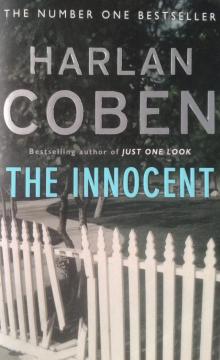 The Innocent
The Innocent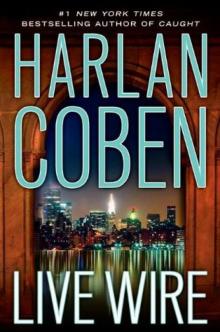 Live Wire
Live Wire Play Dead
Play Dead Drop Shot
Drop Shot Seconds Away
Seconds Away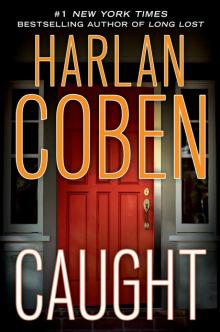 Caught
Caught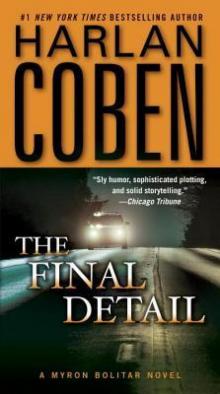 The Final Detail
The Final Detail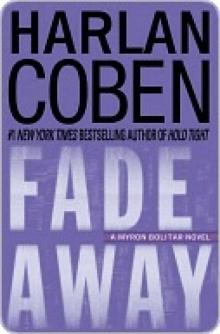 Fade Away
Fade Away Home
Home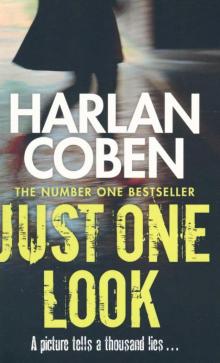 Just One Look
Just One Look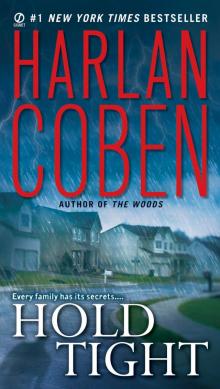 Hold Tight
Hold Tight Fool Me Once
Fool Me Once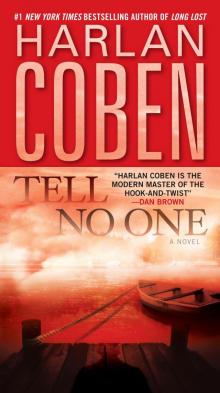 Tell No One
Tell No One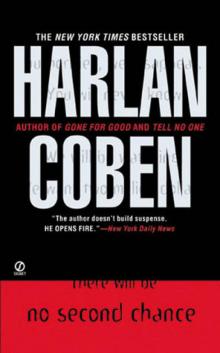 No Second Chance
No Second Chance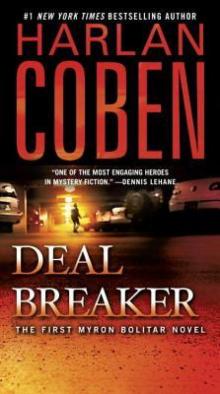 Deal Breaker
Deal Breaker Long Lost
Long Lost One False Move
One False Move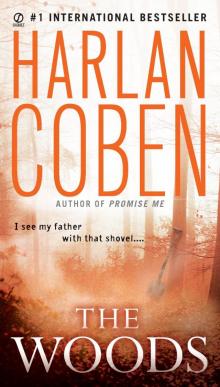 The Woods
The Woods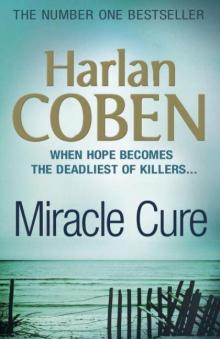 Miracle Cure
Miracle Cure Found
Found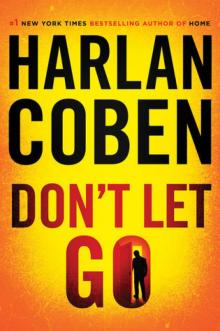 Don't Let Go
Don't Let Go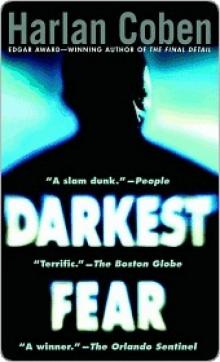 Darkest Fear
Darkest Fear The Stranger
The Stranger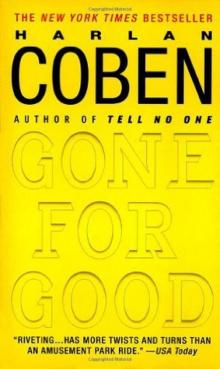 Gone for Good
Gone for Good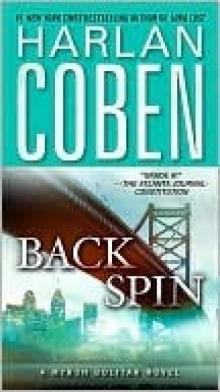 Back Spin
Back Spin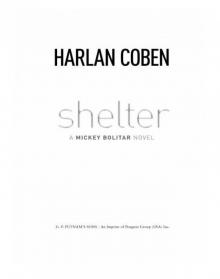 Shelter
Shelter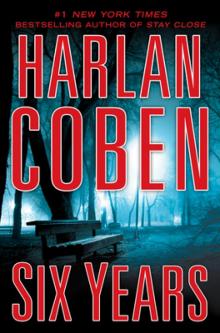 Six Years
Six Years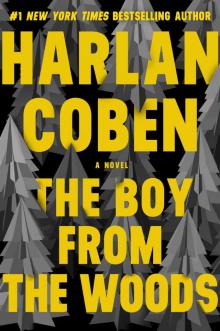 The Boy from the Woods
The Boy from the Woods Missing You
Missing You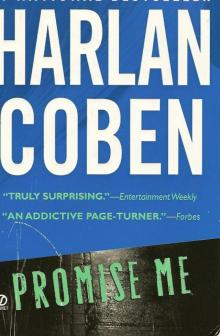 Promise Me mb-8
Promise Me mb-8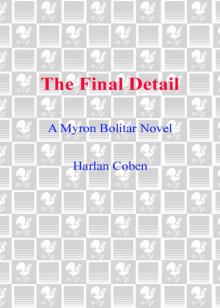 The Final Detail: A Myron Bolitar Novel
The Final Detail: A Myron Bolitar Novel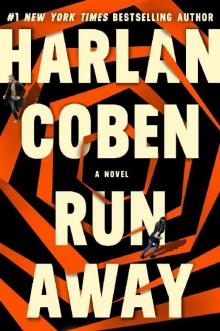 Run Away
Run Away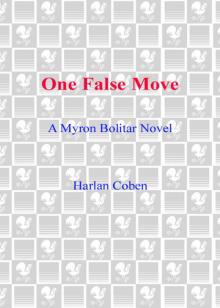 One False Move: A Myron Bolitar Novel
One False Move: A Myron Bolitar Novel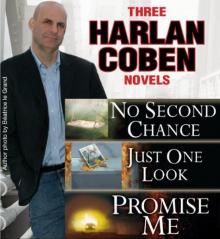 Three Harlan Coben Novels
Three Harlan Coben Novels the Woods (2007)
the Woods (2007) Tell No One (2001)
Tell No One (2001) the Innocent (2005)
the Innocent (2005)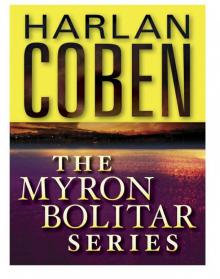 The Myron Bolitar Series 7-Book Bundle
The Myron Bolitar Series 7-Book Bundle Gone for Good (2002)
Gone for Good (2002) Caught (2010)
Caught (2010) Hold Tight (2008)
Hold Tight (2008)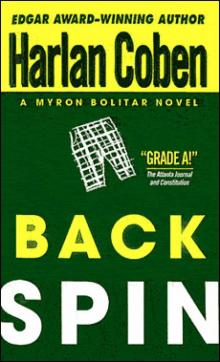 04 - Back Spin
04 - Back Spin Miracle Cure (1991)
Miracle Cure (1991)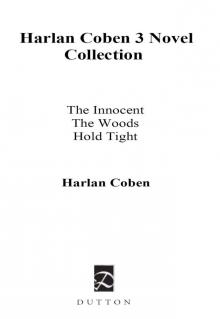 Harlan Coben 3 Novel Collection
Harlan Coben 3 Novel Collection Just One Look (2004)
Just One Look (2004)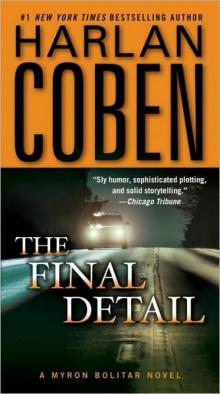 The Final Detail mb-6
The Final Detail mb-6 Play Dead (2010)
Play Dead (2010)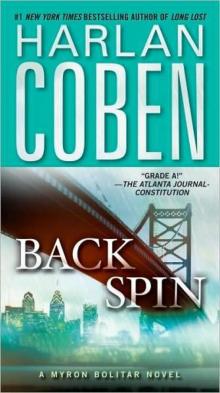 Back Spin mb-4
Back Spin mb-4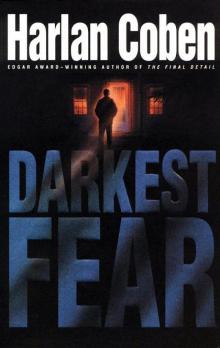 Darkest Fear mb-7
Darkest Fear mb-7